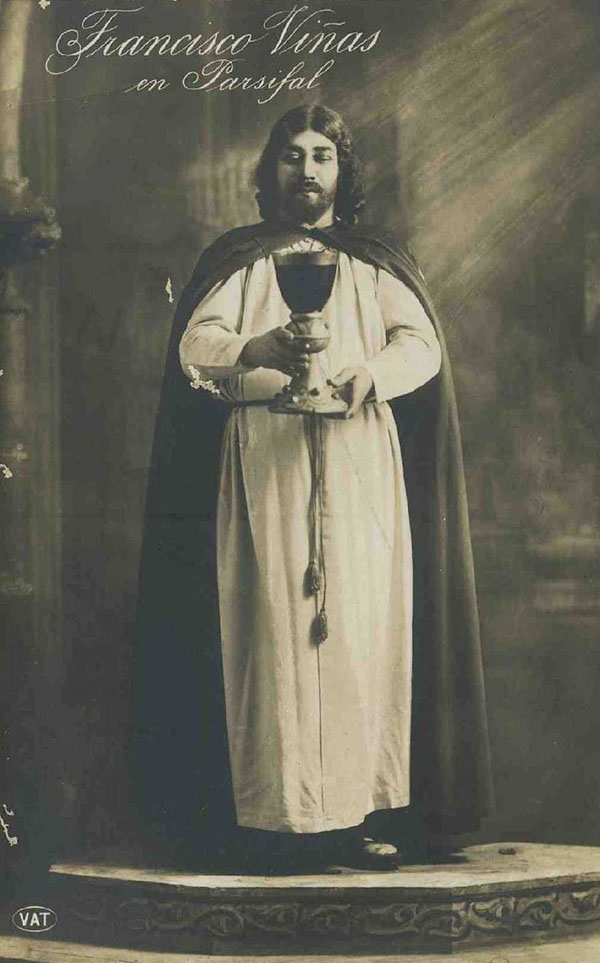Francesc Viñas
I would like to thank Thomas Silverbörg for the recording (Africaine).
He quit his factory job in 1887, and made his debut at the Gran Teatre del Liceu in 1888 as Lohengrin, while continuing to study voice. Next,
he appeared in Valencia: in Mefistofele, and again as Lohengrin – in 18 performances on 18 consecutive evenings! That was his
breakthrough. Soon after, in 1889 already, he made his debut at La Scala (as Lohengrin of course); the San Carlo in Naples, the Carlo Felice in
Genova and Covent Garden in London followed. His 1892 London success was so phenomenal that Queen Victoria had two performances with
Viñas arranged at Windsor Castle for herself and her court: L'amico Fritz and Cavalleria rusticana, both conducted by
Mascagni himself.
After singing a whole lot at all important theaters throughout Italy, Viñas set sail for America in 1894, and made his Met debut as
Turiddu. In 1895, he sang at the Teatro Real in Madrid for the first time (debut role: Lohengrin), and in 1896, he returned to Naples in
triumph, once more as Lohengrin.
The major part of his career was spent at various theaters in Italy, plus in Madrid and Valencia. In 1903, he returned to the Liceu and sang
almost his entire repertory there. From 1905, he also sang a lot in Lisbon, and appeared at the Colón in Buenos Aires as well as in
Sevilla.
Perhaps the greatest highlight was still in stock for him towards the end of his career: on 31 December 1913, he sang Parsifal at the Liceu, in
the very first legitimate performance anywhere outside Bayreuth, after the blocking period following Wagner's death was over; a few months
ahead, Viñas even traveled to Bayreuth, and won Wagner's son-in-law Franz Beidler as the conductor for the Liceu Parsifal. The
performance was a triumph (by the way, it lasted until 5 a.m.!).
Viñas' last stage appearance came in 1916 (Tannhäuser at the Teatro Real in Madrid). His last appearance ever was a concert
with scenes from Joan Manén's opera Acté at the Palau de la Música Catalana in Barcelona in 1918.
Beyond opera, Viñas engaged in organic fruit tree cultivation and fostered the emergence of agricultural co-operatives. Not least, he
wrote a book on vocal technique.
Reference: the fantastic website Interprets Catalans Historics
Lohengrin – Barcelona, 9 February 1888 Mefistofele – Valencia, 8 December 1888 Roméo et Juliette – Torino, 12 March 1890 L'Africaine – Genova, 24 February 1891 Cavalleria rusticana – Genova, 8 January 1891 Simon Boccanegra – Genova, 9 January 1892 L'amico Fritz – Genova, 30 January 1892 Carmen – Palermo, May 1892 Aida – Valencia, 28? January 1893 Tannhäuser – London, 7 June 1893 The veiled prophet (by Charles Villiers Stanford) – London, 26 July 1893 Lucia di Lammermoor – New York City, 4 December 1893 El soñador (by Salvador Giner) – Valencia, 10 April 1901 Sagunto (by Salvador Giner) – Valencia, 27 April 1901 Lorenza (by Edoardo Mascheroni) – Napoli, 7 May 1901 Marie-Magdeleine (by Massenet) – Napoli, 26 March 1902 Germania – Napoli, 20 December 1902 Moïse et Pharaon – Napoli, 13 February 1903 Manon Lescaut – Napoli, 6 March 1903 Andrea Chénier – Napoli, 29 March 1903 Un ballo in maschera – London, 26 October 1904 La Gioconda – Napoli, 30 March 1905 Le prophète – Sevilla, April 1905 Tosca – Lisboa, 1906 Pagliacci – Lisboa, 24 March 1906 Fedora – Lisboa, 5 February 1907 Les huguenots – Sevilla, 21 April 1907 Tristan und Isolde – Lisboa, 1 February 1908 Amor de perdição (by João Arroyo) – Lisboa, 18 February 1908 Samson et Dalila – Lisboa, 27 February 1908 La perugina (by Edoardo Mascheroni) – Napoli, 24 April 1909 Don Carlo – Napoli, 14 January 1910 Los amantes de Teruel (by Tomás Bretón) – Buenos Aires, 12 October 1910 Der Freischütz – Madrid, 14 January 1913 Tabaré (by Tomás Bretón) – Madrid, 26 February 1913 Parsifal – Barcelona, 31 December 1913 Acté (by Joan Manén) – Barcelona, 15 February 1918
Reference: Luigi De Gregori, Francisco Viñas. El gran tenor español fundador de la "Liga defensa del árbol frutal", Barcelona 1935 Reference: The Record Collector, volume 34, July 1989 Reference: Francisco Viñas, El arte del canto. Datos históricos, consejos y normas para educar la voz, Barcelona 1932 |
